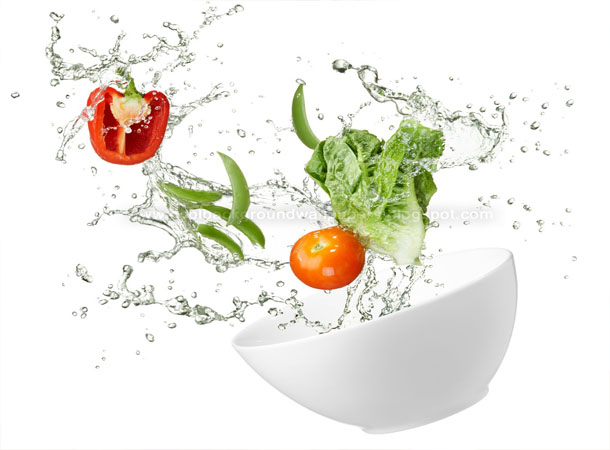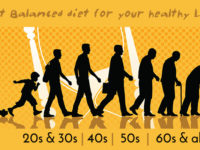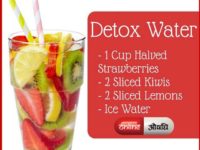1. Radishes
These refreshing root vegetables should be a fixture in your spring and summer salads. They provide a burst of spicy-sweet flavor—and color!—in a small package, and more importantly they’re filled with antioxidants such as catechin (also found in green tea).
2. Tomatoes
Sliced and diced tomatoes will always be a mainstay of salads, sauces, and sandwiches, but don’t forget about sweet cherry and grape varieties, which make an excellent hydrating snack, Gans says. “They’re great to just pop in your mouth, maybe with some nuts or some low-sodium cheese,” she says. “You get this great explosion of flavor when you bite into them.”
3. Cucumbers
No matter how you slice ‘em and dice ‘em, cucumbers keep cool at the number one spot on the list of water-logged fruits and vegetables. Composed of 96 percent water, cukes have no saturated fat or cholesterol, and are very high in vitamin K, vitamin B6 and iron.
4. Salad Greens
Part of the reason that 2 cups of salad greens has fewer than 15 calories is that greens are more than 90 percent water. They are also packed with nutrients, such as folate, vitamin C, fiber and the antioxidant beta carotene, which helps keep your eyes and skin healthy. Plus, having a salad for lunch (or dinner) is a great way to bang out a couple of veggie servings.
6. Green peppers
Bell peppers of all shades have a high water content, but green peppers lead the pack, just edging out the red and yellow varieties (which are about 92% water). And contrary to popular belief, green peppers contain just as many antioxidants as their slightly sweeter siblings.
7. Grapefruit
This juicy, tangy citrus fruit can help lower cholesterol and shrink your waistline, research suggests. In one study, people who ate one grapefruit a day lowered their bad (LDL) cholesterol by 15.5% and their triglycerides by 27%. In another, eating half a grapefruit—roughly 40 calories—before each meal helped dieters lose about three and a half pounds over 12 weeks. Researchers say that compounds in the fruit help fuel fat burn and stabilize blood sugar, therefore helping to reduce cravings.
8. Cauliflower
Don’t let cauliflower’s pale complexion fool you: In addition to having lots of water, these unassuming florets are packed with vitamins and phytonutrients that have been shown to help lower cholesterol and fight cancer, including breast cancer. (A 2012 study of breast cancer patients by Vanderbilt University researchers found that eating cruciferous veggies like cauliflower was associated with a lower risk of dying from the disease or seeing a recurrence.)
9. Watermelon
Ninety-two percent water (hence the name), watermelon is a good source of vitamin C and, when it’s red (some are orange or yellow), also has lycopene, an antioxidant that may help protect against heart disease and some types of cancer. Enjoy fresh wedges (go ahead and see how far you can spit the seeds) or, better yet, get creative with watermelon recipes.
10. Yogurt
Depending on your preferred type, regular plain yogurt is 85 to 88% water (surprisingly, there’s more water in fuller-fat yogurt). You’ll also get calcium, some B vitamins (namely B12 and riboflavin) and, to be sure you’re getting some good-for-you probiotics, look for a yogurt that carries the “Live & Active Cultures” seal.
11. Papaya
At 88 percent water, this fruit will help you stay hydrated. Better yet, 1 cup delivers 3 grams of fiber for just 55 calories.
12. Strawberries
Even without the shortcake, strawberries are a sweet treat perfect for staying hydrated. They are 92 percent water (the most of any berry) and are loaded with fiber and vitamin C — as if you needed an excuse to sip on this refreshing summer cocktail!
13. Lettuce
Iceberg lettuce may be 96 percent water, but it’s not known for much else in the nutrition department. Richer salad greens and sandwich toppers including butterhead, romaine and spinach are more well-rounded choices and still up your hydration. Need some inspiration? Start with these creative, healthy salads.
14. Coffee
Isn’t coffee a diuretic? Well, yes, but a recent study in PLOS ONE debunks the myth that it also causes dehydration. Not only will your daily cup contribute to your water needs, coffee can also give you a sharper memory, boost athletic endurance and performance, and reduce the risk of many serious ailments including diabetes and heart disease.
15. Baby carrots
A carrot’s a carrot, right? Not when it comes to water content. As it turns out, the baby-sized carrots that have become a staple in supermarkets and lunchboxes contain more water than full-size carrots (which are merely 88.3% water).
Sources:
http://www.webmd.com/food-recipes/top-10-ways-to-stay-hydrated
http://www.health.com/health/gallery/0,,20709014_last,00.html
http://www.eatingwell.com/nutrition_health/nutrition_news_information/7_refreshing_foods_to_help_you_stay_hydrated?page=8
http://dailyburn.com/life/health/healthy-foods-stay-hydrated-without-water/
http://cutebackgroundwallpapers.blogspot.com














